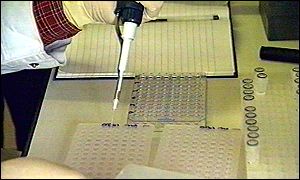
Diabetes Gene Identified
URL: http://news.bbc.co.uk/hi/english/health/newsid_1099000/1099310.stm
Date accessed: 11 February 2001
Wednesday, 3 January, 2001, 19:17 GMT

Researchers have identified one of the genes involved in the development of adult diabetes.
The discovery may help doctors diagnose the disease in its earliest stages, and may open the way to new treatments.
If we could diagnose type 2 diabetes earlier it would help us to
prevent the long term complications more effectively
|
|
Bill Hartnett, Diabetes UK
|
While diet and environment are known risk factors for the disease, type 2 diabetes also tends to run in families. Scientists believe that less than 10 genes may be responsible.
Researchers at the Free University of Brussels believe they have identified one of those genes, which they have called SHIP2. The SHIP2 gene was originally thought to be related to cancer.
Mice experiments
But when the researchers bred mice in which the gene had been de-activated, instead of developing the tumours the mice were born with extremely low sugar levels in their blood, and died shortly after birth.
Dr Stephane Schurmans, who led the research, said SHIP2 appeared to act as a brake on the production of insulin - a hormone which controls blood sugar.
Without SHIP2, insulin levels can soar out of control, pushing sugar levels dangerously low. Dr Schurmans said the research had two potential benefits.
Type 2 diabetics have high blood sugar levels because their bodies are resistant to insulin.
If a drug could be developed to make the SHIP2 gene work more effectively in their bodies, patients' insulin sensitivity could be restored - and their blood sugar levels would return to normal.
Long-term complications
And the finding could help doctors diagnose type 2 diabetes in its earliest stages. At present, many people with the disease are not diagnosed until complications set in - such as blindness or kidney failure.
But by screening the children of people with type 2 diabetes, it should be possible to identify and treat people at risk of the disease years before symptoms appear.
Bill Hartnett, a spokesperson for Diabetes UK, said: "The research is at an early stage, but it certainly does look interesting.
"If we could diagnose type 2 diabetes earlier it would help us to prevent the long-term complications more effectively."
The research is published in the journal Nature.
Categories: 1. Advances in Science/Scientific Discoveries, 32. Genome Project and Genomics